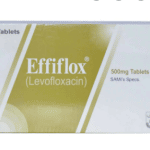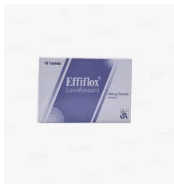delivery within 72 Hours
Effiflox Tablet 250MG
₨ 315
Product Title: EFFIFLOX TABLET 250MG
Generic: Levofloxacin
Pack Size: 10s
Product Form: TABLETS
Delivery within: 2 to 3 working days across Pakistan
Shipping & Delivery
-
Courier delivery
Our courier will deliver to the specified address
2-3 Days
From Rs 250
-
Free 15-Day returns

Black Friday Blowout!
Description
Effiflox Tablet 250mg contains Levofloxacin as its active ingredient. Levofloxacin belongs to the class of antibiotics known as fluoroquinolones and is used to treat a variety of bacterial infections. It works by inhibiting the enzymes necessary for bacterial DNA replication, thereby stopping the growth and spread of bacteria.
Ingredients:
- Levofloxacin (250mg): Levofloxacin is a synthetic broad-spectrum antibiotic effective against a wide range of bacteria, including both gram-positive and gram-negative organisms.
Uses:
Effiflox Tablet 250mg is indicated for the treatment of the following bacterial infections:
- Respiratory Tract Infections: Levofloxacin is used to treat respiratory tract infections, including community-acquired pneumonia, acute bacterial exacerbations of chronic bronchitis, and acute sinusitis.
- Urinary Tract Infections: Levofloxacin is effective against urinary tract infections, including complicated and uncomplicated urinary tract infections (cystitis).
- Skin and Soft Tissue Infections: Levofloxacin is indicated for the treatment of skin and soft tissue infections caused by susceptible bacteria.
- Sexually Transmitted Infections: Levofloxacin may be used to treat sexually transmitted infections such as gonorrhea, particularly when caused by fluoroquinolone-susceptible strains.
Side Effects:
- Gastrointestinal Upset: Nausea, vomiting, diarrhea, or abdominal discomfort may occur with the use of Levofloxacin.
- Headache: Some individuals may experience headache as a side effect of Levofloxacin.
- Tendon Rupture: Levofloxacin may increase the risk of tendon rupture, particularly in older adults or those with a history of tendon disorders.
- Photosensitivity: Levofloxacin may cause increased sensitivity to sunlight or ultraviolet (UV) radiation, leading to sunburn or skin rash.
Precautions:
- Tendon Disorders: Levofloxacin should be used with caution in patients with a history of tendon disorders, such as tendonitis or tendon rupture.
- Central Nervous System Effects: Levofloxacin may cause central nervous system (CNS) side effects such as dizziness, confusion, or hallucinations. Patients should be advised to avoid activities requiring mental alertness until they know how the medication affects them.
- Renal Impairment: Levofloxacin dosage adjustments may be necessary in patients with renal impairment to prevent drug accumulation and potential toxicity.
When Not to Use:
Effiflox Tablet 250mg is contraindicated in patients with:
- Known hypersensitivity to Levofloxacin or any component of the tablet.
- History of tendon disorders related to fluoroquinolone use.
- Children or adolescents under 18 years of age, except in cases of specific bacterial infections when no alternative treatment options are available.
FAQ:
- How should Effiflox Tablet 250mg be taken?
- Effiflox Tablet 250mg should be taken orally, with or without food, as directed by a healthcare professional. It is essential to complete the full course of treatment, even if symptoms improve before the medication is finished.
- Can Effiflox Tablet 250mg be used for viral infections?
- No, Levofloxacin is an antibiotic effective against bacterial infections and is not effective against viral infections such as the common cold or flu.
- What should I do if I miss a dose of Effiflox Tablet 250mg?
- If a dose is missed, it should be taken as soon as remembered, unless it is almost time for the next scheduled dose. Patients should not double the dose to make up for a missed dose and should continue with the regular dosing schedule.
- Can Effiflox Tablet 250mg be used during pregnancy or breastfeeding?
- Levofloxacin should be used during pregnancy or breastfeeding only if the potential benefits outweigh the risks to the fetus or infant. Pregnant or lactating women should consult with a healthcare provider before taking Levofloxacin.
- Is Effiflox Tablet 250mg safe for children?
- Levofloxacin is generally not recommended for use in children or adolescents under 18 years of age, except in cases of specific bacterial infections when no alternative treatment options are available. The use of Levofloxacin in pediatric populations should be carefully evaluated by a healthcare profession
Customer Reviews
You must be logged in to post a review.










Reviews
Clear filtersThere are no reviews yet.